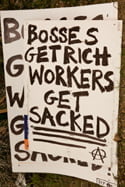Despite a desperate effort from the
Scottish Government, trade unions, the main opposition parties and many
celebrities, Diageo has pressed ahead with plans to cut up to 900 jobs in the
west of Scotland.
The plans will see the closure of the famous Johnnie Walker whisky bottling
plants at Port Dundas in Glasgow and Kilmarnock in Ayrshire. This comes in spite of the fact
that Johnnie Walker is the most widely distributed branch of Scotch whisky in
the world. It also sees a further 200 jobs lost in Glasgow but arguably far
more catastrophic is the loss of 700 jobs in Kilmarnock, a town of less than 50
000 people which has shared an association with Johnnie Walker since 1820. The
current plant has been open there since 1956.
The strength of local feeling was shown
when 20,000 people joined a protest march against the closure of the plant on
July 26th. The march involved workers from Johnnie Walker and trade
unionists alongside a wide range of other interested groups and individuals.
The campaign to save the plant has been largely co-opted by the Scottish
Government. They have chosen the route
of an ‘alternative business plan’ to demonstrate the need for Diageo to keep
the plant open. That is to say that they plan to outdo Diageo at their own game
and argue for the need to maintain the Johnnie Walker plant not on the basis of
social need but profitability.
The stupidity of such an approach was
demonstrated in an independent report commissioned by Scottish Enterprise which
concluded that Diageo’s plans made harsh capitalist market sense. Commenting on
the approach by the Scottish Government, David Gosnel managing director of
Diageo Global Supply stated:
“We examined the alternative proposals
thoroughly. They don’t deliver a business model that would be good for either
Diageo or Scotland….
I appreciate their efforts but the taskforce has no workable alternative to
deliver what Diageo needs”
John Swinney, the Business secretary, has
gone as far as to say:
“I still do not believe that Diageo
appreciate the social consequences of their financial decision in turning their
backs on 200 years of history in Port Dundas and Kilmarnock”
(BBC News 9/9/09)
This is not the concern of the Diageo bosses. As a
vast corporate enterprise their task is to make money. They are legally required
to run their company and make investments in the interest of their shareholders
and not for the social good of their workers or the community. As such their
interests lie in scaling down their operation in the current economic
environment rather than investing the millions that would be required for a new
plant in Kilmarnock. The company has attempted
to justify the closures on the grounds that 400 new jobs will be created at a
new plant in Fife. This does little for the
workers in Kilmarnock and Glasgow
or their families and still results in a net loss of 500 jobs.
Within the boundaries of capitalism and the
market it is clear that the closure of Johnnie Walker and the raft of other
shut downs that we are seeing just now are the logical conclusion of the
recession for the capitalist class. It is simply not profitable to keep plants
during a recession when people cannot consume the commodities they produce.
This results in the phenomena of mass unemployment and sees millions of workers
on an international scale faced with enforced idleness and impoverishment
alongside a raft of idle machinery.
The nationalist administration is backed by
Scottish business interests and it is no surprise that they have presented no
clear answer to the workers at Diageo. It is a tragedy however that the trade
unions involved, Unite and GMB have been all too prepared to tail end them. If
it is the case that there is no market solution to these plants then perhaps it
is the market and not the jobs that have to go? There has been no demand for
the nationalisation of the plant from the union leaders involved in the dispute
or even a call for action by the workers outside of ‘putting on pressure’
through large marches which have also demonstrated the wider support such a
struggle could achieve.
 In recent months workers in Britain and Ireland have occupied plants at
In recent months workers in Britain and Ireland have occupied plants at
Visteon, Waterford Crystal, Thomas Cook, Prisme and Vestas. In these
occupations against closures, concessions have been won. It is true not all
emerged completely successful. However workers have been able to gain
concessions and ensure that their jobs were not at a bare minimum sold away so
lightly. It is clear that without action on a similar level at Johnnie Walker
then these jobs will be lost.
In itself this is not enough, a political
solution is needed. A workplace closed must not only be a workplace occupied it
must be a workplace nationalised.
If Johnnie Walker was taken under state control it should also be so under the control
of the workers themselves who know how to run the plant and could see it used
for the benefit of the community as a whole.
Click here to read the earlier report on Diageo






